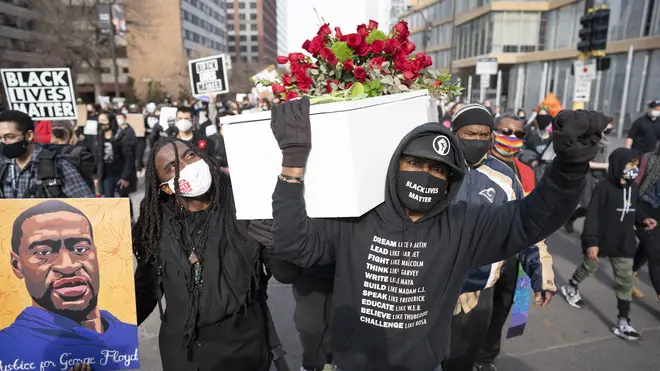
Ali Miraj 12pm - 3pm
8 March 2021, 12:04

Here is a timeline of key events that began with George Floyd’s arrest on May 25 2020 by four police officers in Minneapolis.
George Floyd’s death after his arrest by police officers in Minneapolis on May 25 2020 sparked widespread anger after millions of people saw video of the incident.
The four officers at the scene were quickly fired and soon charged over his death.
The agonising bystander video shows Mr Floyd repeatedly crying “I can’t breathe” and eventually going still as officer Derek Chauvin presses his knee on Mr Floyd’s neck.
The video’s release sparked immediate protests and sometimes violent riots nationwide and around the world.

Chauvin will go on trial on Monday in Minneapolis, facing charges of second-degree murder and manslaughter.
Here is a timeline of key events that began with George Floyd’s arrest on May 25 2020 by four police officers in Minneapolis:
– May 25 2020: Minneapolis police officers respond to a call shortly after 8pm about a possible forgery at a corner shop and encounter a black man later identified as George Floyd, who struggles and ends up handcuffed and face-down in the street. Officer Derek Chauvin uses his knee to pin Mr Floyd’s neck for about nine minutes while bystanders shout at him to stop. Bystander video shows Mr Floyd crying “I can’t breathe” multiple times before going limp. He is pronounced dead at hospital.
– May 26: Police issue a statement saying Mr Floyd died after a “medical incident”, and that he physically resisted and appeared to be in medical distress. Minutes later, bystander video is posted online. Police release another statement saying the FBI will help investigate. Chauvin and three other officers – Thomas Lane, J Kueng and Tou Thao – are fired. Protests begin.
– May 27: Mayor Jacob Frey calls for criminal charges against Chauvin. Protests lead to unrest in Minneapolis, with some people looting and starting fires. Protests spread to other cities.
– May 28: Governor Tim Walz activates the Minnesota National Guard. That night, police abandon the 3rd Precinct station as protesters overtake it and set it on fire.

– May 29: Chauvin is arrested and charged with third-degree murder and manslaughter. President Donald Trump tweets about “thugs” at Minneapolis protests and warns: “When the looting starts, the shooting starts.” Protests turn violent again in Minneapolis and some other cities.
– May 30: Mr Trump tries to walk back his tweet. Protests continue around the country and sometimes turn violent.
– May 31: Mr Walz says attorney general Keith Ellison will lead prosecutions over Mr Floyd’s death and the nationwide protests continue.
– June 1: The county medical examiner finds that Mr Floyd’s heart stopped as police restrained him and compressed his neck, noting Mr Floyd had underlying health issues and listing fentanyl and methamphetamine use as “other significant conditions”.
– June 2: Minnesota’s Department of Human Rights launches a civil rights investigation into the Minneapolis Police Department.
– June 3: Mr Ellison files a tougher second-degree murder charge against Chauvin and charges the other three officers who were involved in Mr Floyd’s arrest.
– June 4: The first of multiple funeral services for Mr Floyd is held in Minneapolis.
– June 5: Minneapolis bans chokeholds by police, the first of many changes to be announced in coming months, including an overhaul of the police department’s use-of-force policy.

– June 6: Massive peaceful protests take place nationwide to demand police reform. Services are held for Mr Floyd in Raeford, North Carolina, near his birthplace.
– June 7: A majority of Minneapolis City Council members say they support dismantling the police department. The idea later stalls but sparks a national debate over police reform.
– June 8: Thousands pay their respects to Mr Floyd in Houston, where he grew up. He is buried the next day.
– June 10: Mr Floyd’s brother testifies before the House Judiciary Committee for changes in holding police officers accountable.
– June 16: Mr Trump signs an executive order to encourage better police practices and establish a database to track officers with a history of excessive use-of-force complaints.
– July 15: Mr Floyd’s family sues Minneapolis and the four former officers.
– July 21: The Minnesota Legislature passes a broad slate of police accountability measures that includes bans on neck restraints, chokeholds and so-called warrior-style training.
– October 7: Chauvin posts one million dollar (£720,000) bail and is released from prison, sparking more protests.

– November 5: Judge Peter Cahill rejects defence requests to move the officers’ trials, and takes the rare step of allowing cameras in a Minnesota courtroom, citing the coronavirus pandemic.
– January 12 2021: Judge Cahill rules Chauvin will be tried alone due to courtroom capacity issues. The other officers will be tried in August.
– February 12: City leaders say George Floyd Square, the intersection blocked by barricades since Mr Floyd’s death, will reopen to traffic after Chauvin’s trial.
– March 8: Jury selection is scheduled to begin in Chauvin’s trial.